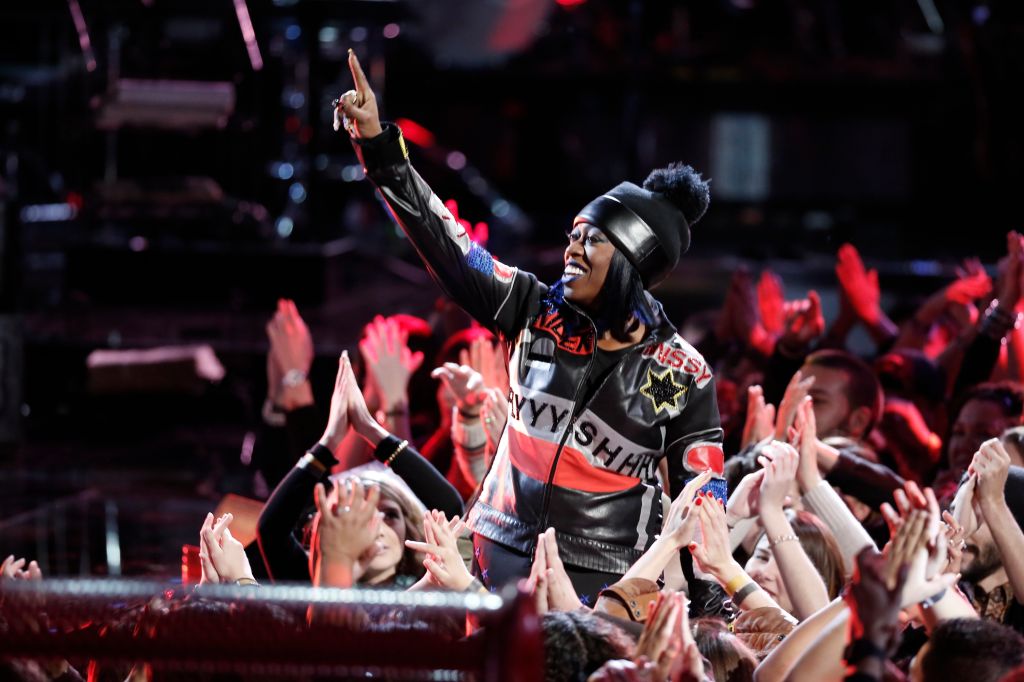
Source: NBC / Getty
It’s never easy to be the first. Never simple to exist close to the razor’s edge. But Missy Elliott has done so throughout her bombastic, iconic career with an infectious pomp that careened with dubiousness. She has long been everything to so many. I met her for the first time while I was plopped down on the couch in the front of the television. Maybe it was after school. Maybe early one weekend. Either way, she was clad in a yellow and sky blue sweat suit, and the line “He He He How / He He He He He He How” leapt off her lips and into our collective ’90s imaginations. This was even before her extremely creative turn as voluptuous garbage bag visionary in “The Rain.” What we didn’t know was we were watching Elliott’s round two.
Her first turn came as part of Jodeci alum DeVante Swing’s group Swing Mob, otherwise affectionately known as Da Bassment Cru. Stashed in New Rochelle, New York, the list of artists who would go on to have charmed, signature careers out of that group include Missy Elliott, Timbaland, Magoo, Tweet, Ginuwine, and Stevie J. In short, the group was overflowing with talent, but jealousy and other factors estranged DeVante from the crew, and he became physically and verbally abusive. He must’ve felt he was holding on for dear life, as the sound of hip-hop was quickly evolving. At that point, Missy thought her out front career was null. But here’s the lesson: she took another chance.
That iconic line on Gina Thompson’s “The Thing That You Do” remix lifted Missy into the cultural imagination. But it was producing Aaliyah’s classic album One In A Million with old basement buddy Timbaland that put her on the course for greatness. Then came that first classic album, Supa Dupa Fly. It was a precursor to today in many respects. She became known not just for banging, trunk rattling beats, but for daring. She wore Mega Man suits with Da Brat in “Sock It To Me.” For “She’s A Bitch,” Missy donned an all-black leather space suit, bold blackened head, and face-covering makeup. In much the same way that FKA Twigs titillated us with a video campaign that thrust her into the spotlight, or how K Dot has again lifted the music video to an art-form, Missy pioneered a pop art visual aesthetic in hip-hop in the vein of Michael Jackson and Prince.
Elliott’s was an art form, a break from the asceticism of early ’90s New York rap’s insistence on taciturn realism or gaudy maximalism. Missy’s music and videos were surreal to the touch, an alchemical reaction that lives in you, like having a bristling crush miraculously reciprocated. It was an innovation. It was Black science fiction, finally out front for the world to see. And, for a time, it was as though the rest of the music industry didn’t exist. Here was Missy helping us to manage the deaths of Tupac and Biggie, leading us back in a direction of fun beats, rhymes, and novelty. It was Timbaland, too, as his genius rushed out into the world.
That was just her first album. In one fell swoop, she’d made it okay to be dark, to be a big woman, to be innovative, sexy, queer, and enigmatic. She brought into the light aspects of Blackness that the culture had tuned out and pretended didn’t exist.
Between 1997 and 2005, Missy created six beat-and-rhyme, envelope-pushing bangers, and at least two classic albums. She was never boring, never without some new thing, be it a dance move or a made up word. My girlfriend at the time was desperately afraid of those opening lines of “Get Ur Freak On” from 2001s Missy… So Addictive. “We don’t even know what it means!” she’d say, in a time before “google” had become a verb. It turned out it meant, “Everyone start dancing together wildly now. Let’s make some noise, let’s make some noise.” And that’s what Missy did until her heavy schedule and Graves disease robbed her from us for a decade.
I could rattle off all her hits and side projects. How she carried on in the face of the untimely death of another icon, and her close friend, Aaliyah. How she and Timbaland somehow made Magoo a star. But Missy will always be remembered for making it okay to be whatever you want to be. In a world as conservative as hip-hop, that meant creating an alternate reality altogether, one where we lived side-by-side, bass cranking heavy out of whatever, in a utopic bid for inclusivity. Is that not a vanguard?
















